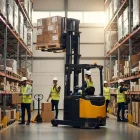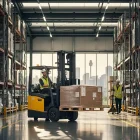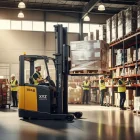In Sydney, the demand for forklift rentals is on the rise. This is due to the city’s bustling construction, warehousing, and logistics sectors.
Choosing the right forklift for your specific needs can be a daunting task. There are various types available, each with its unique features and applications.
This guide aims to simplify that process. It provides an overview of the different types of forklifts available for rent in Sydney.
We’ll delve into the specifics of each type. This includes their unique features, benefits, and ideal use scenarios.
We’ll also guide you through the rental process. This includes key considerations, cost factors, and tips to ensure a smooth rental experience.
By the end of this guide, you’ll be well-equipped to make an informed decision on your rental forklift in Sydney.
Why Rent a Forklift in Sydney?
Renting a forklift in Sydney offers significant cost savings. Buying a forklift involves a hefty initial investment, maintenance expenses, and storage costs. Renting eliminates these financial burdens, providing a more economical solution for many businesses.
Another major advantage of forklift rental in Sydney is flexibility. Businesses with fluctuating demands benefit from the option to rent as needed. You can select the perfect forklift type for each project, adjust rental duration, and manage varying workloads with ease. This adaptability is crucial in a dynamic business environment, allowing for efficient operations without long-term commitments.
Types of Forklift Hire
Choosing the right forklift is essential for efficient operations. Different types of forklifts cater to varied needs. Understanding these options helps streamline your equipment rental decision.
Businesses in Sydney can access a variety of forklifts for hire. Each serves unique purposes, from warehouse management to construction site operations. Making the right choice ensures tasks are completed efficiently and safely.
Here are the main types of forklifts available for rent:
- Counterbalance Forklifts
- Reach Trucks
- Telescopic Handlers
- Pallet Jacks
- Rough Terrain Forklifts
Selecting the ideal forklift type can significantly enhance productivity. Consider the environment, load requirements, and height specifications. This ensures you make a well-informed rental choice for your specific needs.
Now, let’s explore each forklift type and its advantages further.
Counterbalance Forklifts
Counterbalance forklifts are a classic choice for many operations. They have a simple design and are easy to operate. Their primary function is to move loads efficiently in warehouses and loading docks.
These forklifts are robust and versatile. They can handle heavy loads with ease, making them ideal for industrial uses. The dual forks at the front allow direct lifting of loads, providing excellent balance and stability.
Reach Trucks
Reach trucks excel in environments with narrow aisles. They are specially designed for high-reach tasks. Their compact structure allows effortless navigation through tight spaces.
These forklifts have extendable forks, perfect for high shelving. They provide unmatched precision in stacking and retrieving pallets at height. This makes them the top choice for warehouses with vertical storage needs.
Telescopic Handlers
Telescopic handlers, or telehandlers, offer unique versatility. They combine the features of a forklift and a crane. This allows them to handle a range of tasks, from lifting to carrying loads over distances.
Telehandlers are ideal for construction sites due to their extended reach capabilities. They can lift materials high and far, which is essential for building projects. Their adaptability makes them a popular choice for varied applications.
Pallet Jacks
Pallet jacks are indispensable for short-distance load movement. These forklifts are compact and easy to maneuver. They are perfect for moving lighter loads within a confined area.
Operators often use pallet jacks in retail or small warehouse settings. Their low cost and simple operation make them a practical rental choice. They prove efficient for quick, point-to-point transport of goods
Rough Terrain Forklifts
Rough terrain forklifts are built for rugged outdoor conditions. They feature sturdy tires and enhanced suspension. These attributes make them ideal for uneven surfaces, such as construction sites or farms.
Their robust design enables them to navigate and operate in challenging terrains. Their powerful engine and durable build make them suitable for outdoor material handling tasks. They are essential for projects that demand reliable off-road capabilities.
Electric vs. Internal Combustion Forklifts
When choosing a forklift, the power source is a key consideration. Electric forklifts offer several advantages, including lower operational costs. They are eco-friendly and ideal for indoor use due to zero emissions.
In contrast, internal combustion forklifts are known for their power. They run on diesel, propane, or gas, making them suitable for outdoor tasks. Their performance in demanding environments is unmatched, especially where higher power is required.
Deciding between electric and internal combustion depends on specific needs. Consider the operational environment, cost implications, and environmental impact. Balancing these factors ensures optimal forklift performance for your rental needs.
Key Considerations to Rent Forklift Sydney
Renting a forklift involves several critical decisions. Knowing what to consider can save time and money. Making informed choices is crucial for the best results.
First, analyse the weight and height requirements for your specific task. This ensures you choose a forklift that matches your project needs. Consider environmental factors, such as floor type and space constraints.
It’s also important to evaluate the rental company’s reputation and past performance. Ensure they offer reliable service and well-maintained equipment. Review customer feedback and testimonials to gauge satisfaction levels.
Key considerations to keep in mind include:
- Safety standards and certification
- Equipment condition and upkeep
- Rental costs and flexible terms
- Availability of expert support
- Proximity and delivery options
Being well-prepared and informed can optimise rental outcomes. Factor in all relevant aspects for a smooth rental experience.
Safety and Operator Training
Safety is paramount when renting a forklift. A well-trained operator minimises risk and enhances efficiency. Ensure that your team is trained and certified for forklift operations. Many rental companies offer operator training as part of their services.
Look for safety features in the forklift itself. Stability controls and ergonomic designs play a big role. Prioritise safety and competency for a secure work environment.
Assessing Rental Forklift Condition
Before agreeing to rent, inspect the condition of the forklift. Look for signs of wear and any potential maintenance issues. This prevents unforeseen breakdowns during your rental period.
Check operational elements such as brakes and hydraulic systems. A test run can reveal functional problems. A thorough inspection ensures the equipment meets your standards.
Maintenance and Service Support
Reliable maintenance and service support are vital during a rental term. Understand what the rental company includes in their maintenance package. This ensures that you avoid unexpected downtime.
Choose companies that offer prompt service and repair assistance. A clear support plan saves time and maintains project momentum. Inquire about their response times and service protocols.
Cost Factors and Rental Process in Sydney
Understanding the costs and rental process is essential for efficient forklift rental. Several factors can affect costs and availability, such as rental duration and equipment type. Consider these aspects carefully to optimise spending.
Sydney offers a diverse range of forklift rental options. This variety allows you to find solutions tailored to your budget and project needs. Always compare rates and terms from multiple providers for the best deal.
The rental process involves selecting equipment and confirming terms with the provider. Clear communication and planning can expedite this process. This ensures a seamless experience and timely equipment delivery.
Understanding Rental Costs
Rental costs depend on various elements like duration and forklift specifications. Higher capacity forklifts generally cost more. Longer rental periods often attract discounted rates.
It is crucial to understand any additional fees. Charges for fuel, delivery, and insurance can add to the total cost. Transparency in costs helps in budget planning and avoids surprises.
The Rental Agreement
A detailed rental agreement outlines terms and conditions. It ensures clarity on both parties’ obligations. Carefully review this document before signing.
Look for specifics on liability, damage cover, and return policies. Understanding these can prevent future disputes. Ensure the agreement aligns with your project needs and timelines.
Delivery and Pickup Options
Many rental companies offer convenient delivery and pickup services. This saves you time and logistics hassle. Verify these options when arranging the rental.
Discuss delivery timelines to ensure they fit your project schedule. Flexibility in pickup and drop-off can be beneficial. Efficient service enhances your rental experience and minimises disruptions.
Conclusion: Maximising the Benefits of Forklift Rental
Renting a forklift in Sydney offers flexibility and cost savings. It caters to varying operational needs without the burden of ownership. Selecting the right forklift type and rental provider is crucial.
Plan ahead and communicate your needs clearly with the rental company. This approach ensures you leverage all the benefits of forklift rental. Proper selection and planning lead to increased efficiency and productivity for your project.




